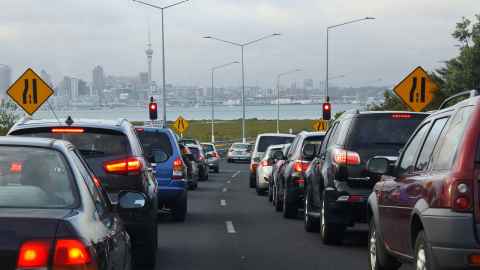Fresh ideas from early career researchers
29 August 2025
The Emerging Researcher Network has selected the successful proposals for the network's inaugural seed funding round.

Will congestion charging exacerbate health inequity in Auckland? Can AI help monitor mussel beds? Do we need more scrutiny of social media advertising?
These and five further research proposals have gained funding from the inaugural Emerging Researcher Network (ERN) Seed Fund, a new initiative designed to encourage interdisciplinary collaboration and give researchers the chance to test bold ideas, build new partnerships, and position themselves for larger external funding.
The ERN is led by emerging researchers, for emerging researchers. It aims to strengthen opportunities for early and mid-career researchers (EMCRs) to pursue independent projects, expand their research networks, and embark on new lines of inquiry.
“Supporting new collaborations and funding them will have a big impact on nurturing the careers of EMCRs,” says ERN Chair Dr Matthew Sullivan, Faculty of Science. “The opportunities provided by ERN will help develop high-impact, interdisciplinary research at the University.”
The inaugural funding round has supported projects spanning the Business School, the faculties of Science, Engineering and Design, Medical and Health Sciences, Arts and Education and the Auckland Bioengineering Institute, with a total sum of $22,000.
The seed funding supports emerging researchers to apply for further funding, and for publications and reports. In total the ERN received 35 proposals for consideration
Emerging Researcher Network inaugural Seed Fund grants
- Seeding the Aotearoa Ad Observatory: Exploring social media ad exposure and public health. Pragea Putra (Business) and Kelly Garton (FMHS).
- AI-enhanced mussel bed monitoring: Using satellite imagery. Wenjie Wu and Katerina Taskova (Science).
- More than numbers: How intersecting identities shape young people's accounting career aspirations. Yuki Guo (Business) and Naashia Mohamed (Arts and Education).
- Health equity impacts of Auckland's Congestion Charging Scheme: Hyesop Shin (Science), Jamie Hosking (Medical & Health Sciences), Wendy Liu and Minh Kieu (Engineering & Design).
- Finite element modelling of the human eye lens: Wilson Pan & Alyssa Lie (FMHS) and Vickie Shim (Auckland Bioengineering Institute).
- Gastroenterology and dietetics access for Ehlers-Danlos Syndrome: Nicola Gillies (FMHS), Natalia Boven (Arts & Education) and David Musson (FMHS).
- What Women Want: Physical activity, knowledge, attitudes, and barriers in women aged 45+. Rebecca Meiring and Estelle Watson (Science).
- Open-source low-cost fluorescence plate reader: Joseph Ashby and William Pearman (Science), and Derek Orbaugh (Auckland Bioengineering Institute).
Media contact: mediateam@auckland.ac.nz